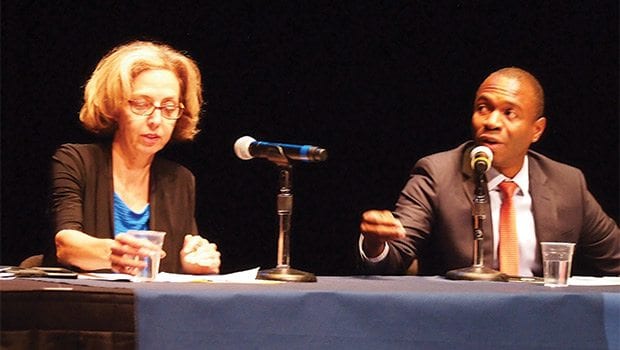Money key in Question 2 charter school expansion debate
Supporters, opponents dispute costs

Across Massachusetts supporters of Ballot Question 2, which would lift the statewide cap on charter school expansion, are squaring off against measure opponents in school committee meetings, public forums and on the airwaves in what will likely be the most expensive ballot question in state history.
Supporters and opponents are expected to surpass $30 million in campaign spending. At stake is more than $15 billion in K-12 education spending across the state. During a Ford Hall Forum debate last week both sides of the ballot initiative drilled down on funding issues.
While supporters of Question 2 argue that the state funding — and the cost of educating an individual student — follows the student from district to charter schools, opponents say that the way the question was written — increasing the number of schools without any additional funding — will force existing charter and district schools and the new charters to compete for a finite pool of resources.
Great Schools Mass Coalition Director Shane Dunn argued that charter schools actually increase education funding because district schools receive partial funding for the students they lose to charter schools. City Councilor Tito Jackson maintained that the Legislature has consistently under-funded those reimbursements and that the loss of funding to charters leads to district school closures.
Assessments for charter schools and the cost of busing students to charters costs Boston $175 million a year, Jackson said. If three new schools open each year in Boston, Jackson said, it could force the closure of as many as 45 district schools.
Dunn ignited Jackson’s ire when he argued that the state does not need to spend more funding on public education, at one point stating that Boston, with a $1.3 billion school budget, is spending more money on its schools than ever before, arguing that the city and state are “throwing money” at public education.
“We’ve been throwing billions of dollars at public education for decades and not getting results,” Dunn said.
Jackson countered that the state has not maintained adequate funding for public schools, citing a report from a bipartisan group of lawmakers that found that the Legislature has underfunded the so-called foundation budget for k-12 education by $1 billion a year.
The ballot question, he argued, is a diversion from the larger issue of funding.
“This actually skirts the real issue,” he said of Question 2. “We’ve been de-funding education in Massachusetts, not only for district schools, but also for charters. If we’re going to solve the problem, we have to invest in public schools.”
The Ford Hall Forum exchange mirrors debates that are playing out across Boston and the state on the editorial pages of newspapers and in city and town halls. Mayor Martin J. Walsh, a founding board member of the Neighborhood House Charter School, spelled out his opposition to the charter expansion Question 2 would facilitate, arguing that the current funding formula in which charters receive the average per-pupil funding in a district doesn’t account for the fact that charter schools educate fewer high-need, high-cost students.
Mayor weighs in
Walsh claimed the charter assessments Boston pays, which now account for 5 percent of total city spending, could mushroom to 20 percent over the next decade.
“It’s a looming death spiral for our district budget, aimed squarely at the most vulnerable children in our city” Walsh wrote. “It’s not just unsustainable, it’s unconscionable.”
In a City Council meeting Monday, the city’s Chief Financial Officer David Sweeney said charter assessments against the district could rise as high as $800 million a year by 2028 if the charter cap is lifted.
While Walsh, U.S. Sen. Elizabeth Warren and U.S. Reps. Michael Capuano and Katherine Clark have come out against charter school expansion, Gov. Charlie Baker, U.S. Rep. Stephen Lynch and state Reps. Marcos Devers and Frank Moran are among those supporting the measure.
Several national organizations, including the NAACP and the Movement for Black Lives, have passed resolutions calling for a moratorium on charter school expansion. Charter proponents in Massachusetts point out that President Barack Obama and U.S. Secretary of Education John King support charter school expansion.
As of Monday, 200 school committees in Massachusetts passed resolutions against Question 2. Statewide education organizations and the Massachusetts Municipal Organizations are also opposing the measure.
At the Ford Hall Forum, former state Board of Education member Harneen Chernow stressed that the funding battle is the major sticking point in the battle over the ballot question.
“If this ballot question had be proposed with money to pay for it, if this were about building one system without destroying another, it would be a different conversation,” she said.
Chernow also contended that the Board of Education has not done an effective job in regulating charters.
“It’s not a given that a charter is going to have a better outcome than district schools,” she said. “Some of the charters are better, many of them are the same, many of them are worse.”
Chernow said the 15 percent of charter schools in the state are on probation, and that the board has closed only five in the 23 year history of charters in Massachusetts.


![Banner [Virtual] Art Gallery](https://baystatebanner.com/wp-content/uploads/2024/04/Cagen-Luse_Men-at-store-e1713991226112-150x150.jpg)



